The Philippine Readers & Writers Festival 2016: On Writing the Real, and the Filipino Literary Bingo
I recently joined National Book Store and Raffles Makati's Philippine Readers and Writers Festival on August 26 as panelist for the University of the Philippines Press's "Lines of Flight: The Practice and Limits of Realism in Philippine Fiction", moderated by Prof. J. Neil Garcia.
Here are some thoughts I shared in the panel (based on my rambly introduction and my squiggly notes):
Here are some thoughts I shared in the panel (based on my rambly introduction and my squiggly notes):
- I'd like to start with the realism vs speculative fiction dichotomy, and the charge that "all fiction is speculative".
- It depends on what is being speculated upon. For speculative fiction, you speculate on what happens when you change the rules of the world.
- It's about extending the what-if. What if you are a nun who falls in love? A beautiful premise for a realist story. Extend the what if: What if you are a nun who falls in love so much that you explode? What if you find a dead body in your house? Realist. Probably crime fiction, a thriller. What if your essence or soul can jump from one body to the next, and the body you jump into has a house, and in that house is a dead body? (This is Dwellers.) Now we have speculative fiction. You changed the rules of the world. (People don't literally explode just because they love so much. People can't make their soul jump from one body to the next.)
- I write not only to re-shape the world, but to re-shape the rules of the world.
- In realist fiction, you try to find the extraordinary in the ordinary; in the stories I write, I place them side by side.
- Reasons for why I write this: I grew up with these stories (the sirena, the mangkukulam); I grew up reading a lot before eventually writing my own stories, and always I ask, what else can I do to contribute something new to Philippine letters?
- Certain genres follow certain beats, and they can serve as a shared language to draw people in. You may not be particularly drawn to Filipino culture, but you may pick up Mythspace because the shared language of the space opera draws you in. (Even though this particular space opera has elements you may not be familiar with, like the aswang in spacesuits.)
- Certain readers who read a certain portion of Philippine literature seem to play the Filipino Literary Bingo when thinking of our local lit. May sapa ba? May kalabaw? May magsasaka? I enjoy these stories, but these are not the only stories we can tell.
- Look at how Einstein interpreted the world. How was he able to share what he understood? Through stories. What if you move so fast time slows down for you? These stories are backed by theory; our stories--be it realist or speculative fiction--need to be backed by an honest, open-eyed examination of the human condition.
We write to reach illumination, said Prof. Garcia. Through stories, you can resolve not just the plot, but also how you viewed the world, said Prof. Sicat-Cleto.
This panel was recorded, and the transcript will appear in the next issue of the Likhaan journal. A fantastic idea, as we hardly record ourselves, and lose fantastic discussions like this to the ether.
ANNOUNCEMENT: Speaking of speculative fiction, I will be serving as panelist for the first Amelia Lapeña-Bonifacio Writers Workshop in October, which will close to submissions TOMORROW, AUGUST 30. Go submit!
This panel was recorded, and the transcript will appear in the next issue of the Likhaan journal. A fantastic idea, as we hardly record ourselves, and lose fantastic discussions like this to the ether.
ANNOUNCEMENT: Speaking of speculative fiction, I will be serving as panelist for the first Amelia Lapeña-Bonifacio Writers Workshop in October, which will close to submissions TOMORROW, AUGUST 30. Go submit!
The deadline for the Amelia Lapeña-Bonifacio Writers Workshop has been extended to August 30. This year’s focus is on speculative fiction.
The Workshop Director is Charlson Ong, with award-winning writers Eliza Victoria, Nikki Alfar, Will Ortiz, and Vladimeir Gonzales serving as panelists and teaching staff.
The Amelia Lapeña-Bonifacio Writers Workshop will accept 12 fellows: six writers in English and six in Filipino. Application is open both to published and unpublished writers who are between 18 and 35 years old as of August 15, 2016. Entries must be two unpublished stories (in English or Filipino, but not a combination of both) with a length of 3,000 to 10,000 words per story. The portfolio must be accompanied by a short bionote, not more than 150 words. The author’s name must not appear anywhere on the stories.
The workshop is set for October 14 to 16, 2016. Successful applicants will receive a modest stipend, as well as board and lodging at the workshop venue.
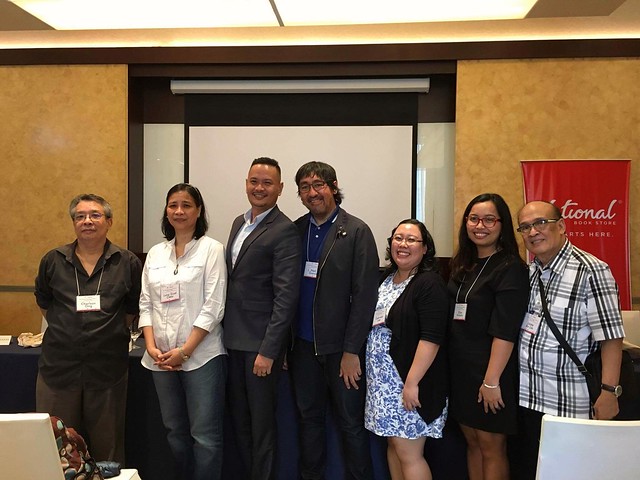 |
| L-R: Charlson Ong, Luna Sicat-Cleto, Dean Alfar, J. Neil Garcia, Gabriela Lee, me! and Jaime An Lin |
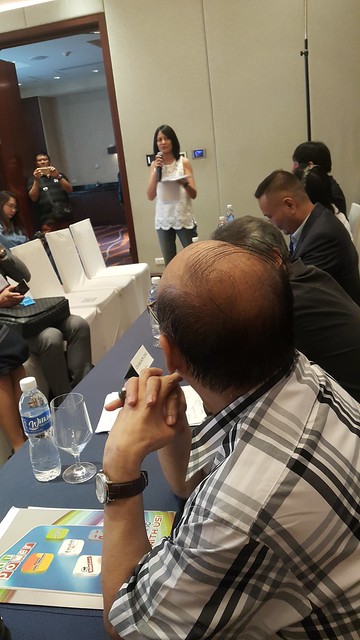 |
| Olive from UP Press introducing the panelists |
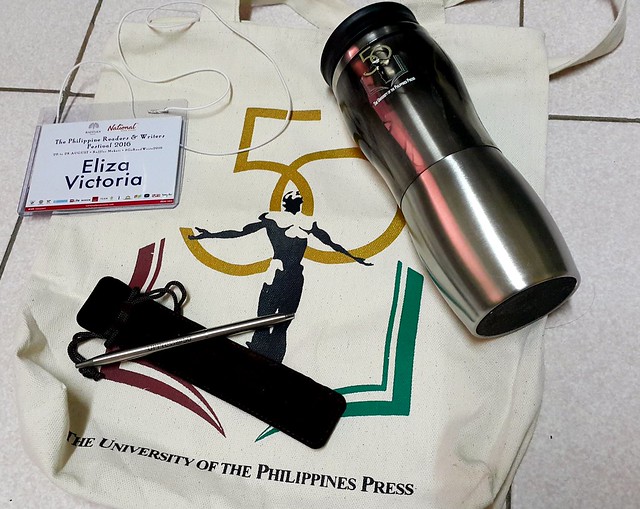 |
| Thank you UP Press! |
I also dropped by to listen to Anvil Publishing's "Teaching Young Adult Literature" with Carla Pacis, Cyan Abad-Jugo, and Sophia Lee.
Cyan Abad-Jugo shared this interesting study:
On August 27, I returned for the official launch of my book, Wounded Little Gods. I read from the book's first chapter and answered some questions.
Thank you to those who dropped by!
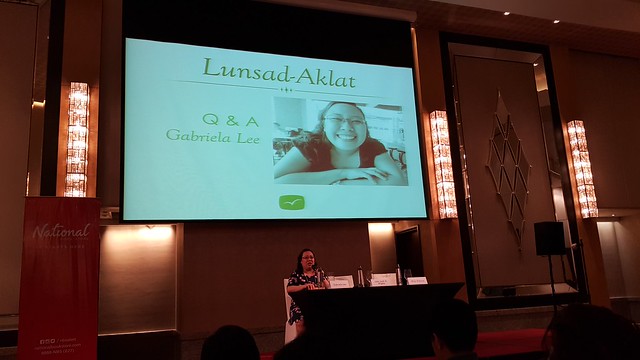 |
| Gabriela Lee launching her first short story collection, Instructions on How to Disappear |
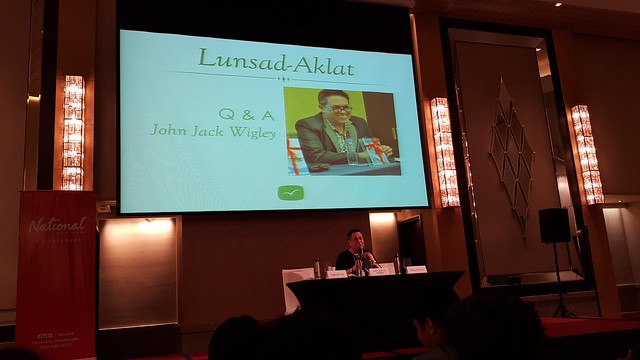 |
| John Jack Wigley launching his Filipino essay collection, Lait Chronicles (lait = Filipino word for "insult"; these are not essays about milk!) |
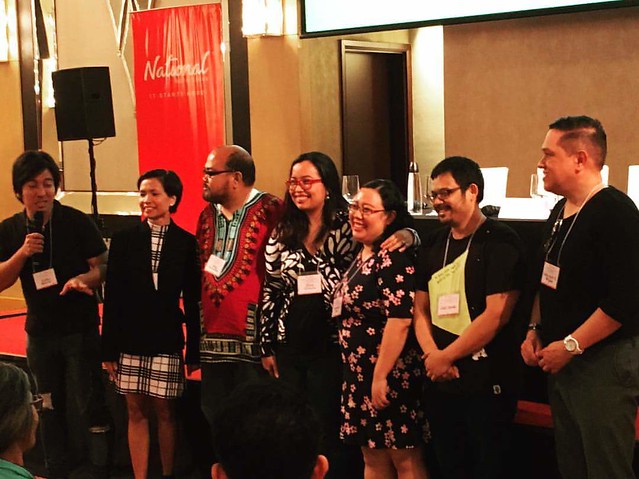 |
| L-R: Siege Malvar, Nida Ramirez, Joey Arguelles, me!, Gabriela Lee, Carljoe Javier, Jack Wigley |
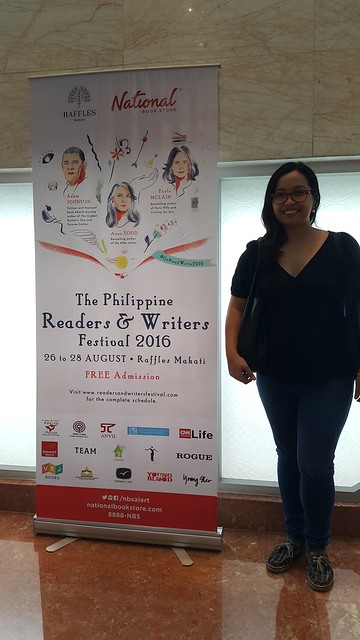
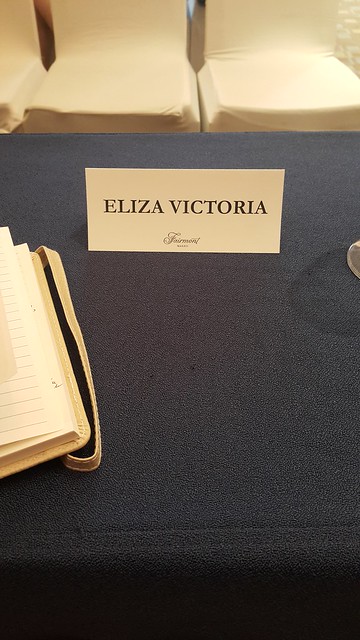
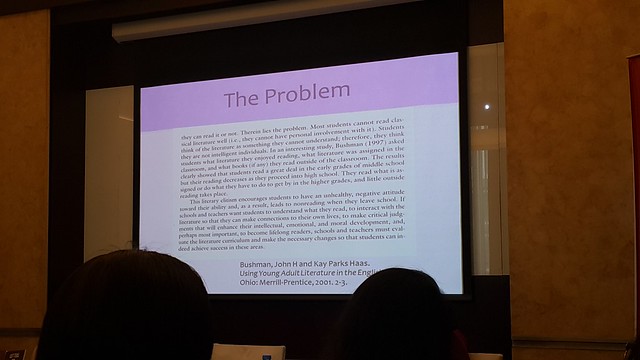
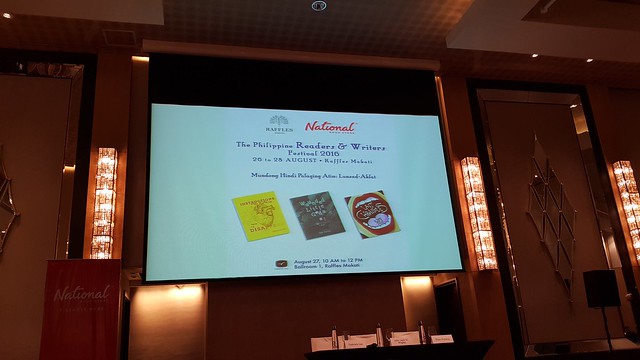


Comments
Post a Comment